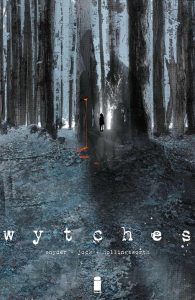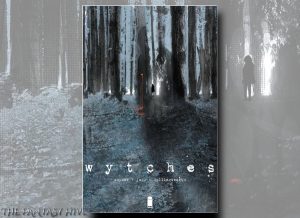WYTCHES by Scott Snyder and Jock (GRAPHIC NOVEL REVIEW)
Wytches by Scott Snyder, and illustrated by Jock, is a horror graphic novel that is interested in telling its story, and its story exclusively. It is not attempting to present a grand unified theory of folk horror, it is not attempting to isolate all of the elements that make folk horror a genre and rattle through them for your perusal. It has a solitary purpose, conveying the story of the Rook family, who have moved to a new town to escape from lingering suspicions following their daughter Sailor, who was suffering from terrible bullying right up until the moment her bully mysteriously vanished in the woods.
The titular wytches were of course responsible for the death of said bully, who one would struggle to argue didn’t deserve literally any comeuppance after the brief flashback to her behaviour towards Sailor. These wytches are the monster of the piece, and they can be found everywhere and anywhere that there are deep dark woods. Snyder cuts through all of the paraphernalia of the horror and cuts directly to the root of the thing. The woods are deep and dark and that frightens us, even if we do not know why with any rationality. We have created myth cycles since time immemorial all the way up to modern fairy tales and fantasy to explain the why, and Wytches skips right to the point. There is something bad out there.
 What the wytches are is debated a little internally within the story. Some argue that they represent a branching path of evolution, resulting in something human-esque, but so much more. What they are not is mysterious and persecuted old women performing rites of abandoned pagan religions. If anything they come closer to being ancient pagan gods than representing their historical worshippers. And their power is limitless.
What the wytches are is debated a little internally within the story. Some argue that they represent a branching path of evolution, resulting in something human-esque, but so much more. What they are not is mysterious and persecuted old women performing rites of abandoned pagan religions. If anything they come closer to being ancient pagan gods than representing their historical worshippers. And their power is limitless.
Typically in folk horror, the supernatural is a little more hands-off, with human worshippers serving the role of the ‘muscle’ but at no point in Wytches do you get the slightest sense that a single wytch couldn’t tear through the whole human cast effortlessly. But it isn’t their ability to scratch and bite and consume their victims that makes the wytches dangerous, it is their limitless power. They can make anything happen. Any wish can come true, from the purest and most virtuous to the most depraved and self-serving. All that needs to happen for any given human to get what they most desire is to pledge another living human to the wytches as a sacrifice.
Because the wytches do not take without being asked, any more than they give without being asked. No victim is taken that another human being has not betrayed to the inhuman. And it is this betrayal that the entire story of the book pivots on. Everyone in the world wants something, and through the wytches, they can get it. From there it becomes a matter of the price that they are willing to pay. In whatever ritual of sacrifice is being played out across this tale, betrayal seems to be the key component. Some are offered up as sacrifice without betrayal, and it never seems to take, the wishes do not come true, or at least not as potently as they do when the one being given over to the wytches has given absolute trust to their betrayer.
So despite being a story about otherworldly powers and antediluvian horror beyond imagination, it remains grounded in the here and now. In the humanity of its cast of characters. The wytches exist, and much like the bully, it is hard to view them as anything other than pure evil, but that evil cannot touch the human cast until they invite it in, until they cut deals with it, until they open the door.
The cast of human characters are all damaged in their own ways, whether physically or psychologically, every member of the Rook family is deeply flawed. But in this story we get to see the rare moments where co-dependence and self-destructive habits actually bring out the best in mankind. Where one character is able to leave behind their own flaws and baggage and ascend for the good of another one. If the plot pivots on betrayal, then the loyalty and love of the central characters is the counterbalance, swinging back in the opposite direction and causing chaos as it strikes against an endlessly repeating pattern of events that has been going on since the dawn of time. Looking at the flawed, and perhaps even broken, characters of the Rook family, assuming that they will be easy prey for the wytches is a given. They can barely hold themselves together at the best of times. But when crisis strikes and amplifies their flaws, it doesn’t make them weaker, it makes them into their very own kind of monster. One capable of standing against the impossible.
I would be remiss to discuss this book without mention of the Irons and their lore. The Irons are a loosely organised society on the fringes of civilisation who try to fight back against the wytches. It is from one of them that we learn many of the mechanics of the wytches, and that most of society has been subverted into their services. It is from these mentor characters you might have expected to find the magic bullet that allows our heroes to win out. This is not that kind of story. There is some technical detailing about how specific aspects of wytch behaviour might be used to avoid them, but for the most part, all that the Irons manage to convey is a sense of overwhelming dread.
This is also where Wytches bucks free of the ‘folk horror’ framework and becomes something more akin to cosmic horror. When you realise that the whole of human civilisation stretching back to antiquity has benefited from the assistance of the wytches. That every great man, and great feat, has been done with their aid, for the terrible price that they charge. The Irons are framed as anarchists and the homeless, pushed to the periphery because they refuse to engage in society as it is. They refuse to play the game and get ahead by sacrificing other people’s lives to make their own easier. Which doesn’t take much squinting to see as an indictment of our capitalist society where there is no possibility of ethical consumption.
To survive or thrive in the world of Wytches, you must be willing to accept that others are going to suffer and die as a consequence of your success. You must betray mankind to the system, or gods, or wytches if you want to win. Or you need to be completely ignorant to the way that the world works so that you can continue through it in a blinkered haze, entirely unaware of the evil being done all around you by the people you care about so that you might live without the burden of conscience.
Fundamentally, Wytches asks us what we would be willing to sacrifice for the ones we love, or for our own happiness.
What price would you pay to make your dreams come true?
Wytches is available now – you can order your copy on Bookshop.org

